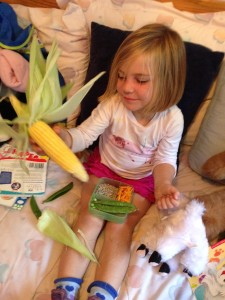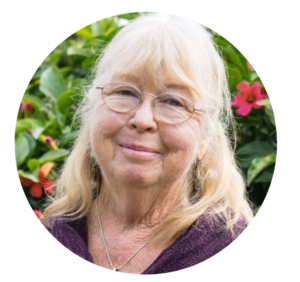 Hearing Congressman Sam Farr say that at 75 he’s decided to retire and become the full time caregiver for his grandchildren made me wonder just how meaningful he will find that after a few years. I’ve been retired now for three years, and I have discovered that if I’m going to be an interesting companion for my granddaughter, I need to do other things as well.
Hearing Congressman Sam Farr say that at 75 he’s decided to retire and become the full time caregiver for his grandchildren made me wonder just how meaningful he will find that after a few years. I’ve been retired now for three years, and I have discovered that if I’m going to be an interesting companion for my granddaughter, I need to do other things as well.
I was nudged into retirement a bit earlier than I had originally planned, but felt optimistic about the opportunities it afforded. I had been thinking about retirement for several years, not seriously, but more than once a week. My youngest child was gainfully employed, I had reached the maximum compensation level on my retirement plan, and I was very tired at the end of each workday. When my oldest daughter told me she was expecting a baby, I quickly agreed to move closer and help her with infant care.
Caring for a Grandchild is “Pretty Wonderful”
And that was pretty wonderful, I’ll be the first to admit. Holding my granddaughter while she slept, singing to her, watching her learn each day . . . these were delights that I hadn’t appreciated with my own children, and now I had the time to devote to paying attention and creating a safe space for this little person when she was away from her parents.
But as fascinating as Bean was, being her grandmother wasn’t quite enough. Before retiring, I had been responsible for an entire academic program, a sizable budget, a teaching staff, and a full teaching and advising load. The sense of satisfaction that I had felt as I walked along a corridor and heard the hum of teachers and students talking, or the joy when a student persisted through a difficult semester and came in to tell me he had passed all his classes . . . well, I missed it. I looked forward to each day I spent with Bean, but the other days, and nights, stretched out in front of me, years and years of them. My friends, my gym, my church, my favorite haunts, even my dry cleaners, were all back in the community I had left behind. I was lonely. I wasn’t sure who I was any more. And I wasn’t always fun to be with.
It turns out that feeling a loss of purpose and meaning after retirement is not unusual.
Loss of Purpose After Retirement
I did some reading on the subject, and I found that my feelings were echoed by several writers. The Canadian Alliance on Mental Illness and Mental Health described retirement as “a time of change that can catch us off guard:”
At first, the time away from work can be a relief, like an extended vacation. But retirement may mean a loss of your work role and authority, and you no longer have the routine of getting up and going in to the social atmosphere of most workplaces. With time you may feel unproductive with no purpose or contribution from yourself. Some people start to feel like they’ve gone from a somebody to a nobody without a job or work to help define them. And it’s easy to get isolated from social contacts. With time, this can be unhealthy for your mental and physical health.
Last fall I went to a Lifelong Learning Institute general meeting and signed up for a class called “The 3Rs of Retirement.” The class is ably led by Dr. Jill Steinberg, a retired Psychology professor, who has been collecting stories about retirement for some time. Over the last few weeks she has been sharing her research with us, suggesting directions of inquiry, and inviting us to share our own experiences. And we have. I suppose I had originally hoped that Jill would provide a formula for success in retirement, but instead she turned the question back on us, and we have been taking turns describing how each of us has structured our new life, what challenges we have faced, what is working and what is not.
One commonality is that most of us have felt lonely at times. Ironically, having time alone may have been something we looked forward to in retirement. We all need some time alone, but it turns out that being alone when we would rather be connected to other people isn’t good for us. Self-esteem often starts declining around the time of retirement, according to the American Psychological Association, and I believe that one of the contributing factors is loneliness.
Swimming Against the Tide
Here are some of the suggestions our 3 Rs group members have made for reducing loneliness:
- Prevent isolation by staying active; participate in scheduled activities where you can meet other people with the same interests or of a similar age. But also spend time with people of different ages and with a variety of interests.
- Volunteer part-time in a local school or children’s garden. Being around children brightens your life with their enthusiasm and energy. Spend time with grandchildren or other young family members.
- Take classes, like the ones offered by the Osher Lifelong Learning Institute, or at the local community college or university. Join a book club; take up a new hobby; learn to paint, play an instrument, speak a new language.
- Learn to recognize and deal with the signs of depression. When it hits, go for a long walk; read an interesting book; call a friend and invite her to lunch.
Bean is now 4 1/2. I still spend at least two afternoons a week with her, and due to my daughter’s cancer treatments, lots of other times as well. It has been a difficult year, and I am really glad that I was able to be here for her. However, I’ve also managed to squeeze in a few other things, and they have made all the difference in how I feel when I wake up each morning.
I attend a senior exercise class three mornings a week. People I’ve met there have introduced me to musical events, restaurants, gardening tips; and invited me to social activities. I’m now fitter, stronger, and more energetic than I was three years ago, which helps me keep up with our active little girl.
Last spring I volunteered at Life Lab, an educational gardening program sponsored by the University of California, then registered Bean for summer camp and helped out during her session. I took part in several weekend trainings run by the local school district then volunteered two mornings a week in a Young Writer’s program. Being with the fourth graders energized me, and I found myself drawn into a fiery debate about teaching cursive writing in elementary schools.
I attended a lecture by Daniel Siegel, and I soon found myself immersed in they way he integrates neuroscience research with the ancient art of mindfulness. Here is the final paragraph of his book The Mindful Brain, which suggests a direction for my future inquiries.
Kindness is to our relationships, on this precious and precarious planet, what breath is to life. With reflection we can nurture in each other an access to a self deeper than personal identity, that ipseity of being that we all share. From this mindful place, there may be a path toward healing our global community one mind, one relationship, one moment at a time.
With the terrorist attacks in Lebanon and Paris this week weighing heavily on all of us, perhaps we can set aside our personal quests for a while and and consider ways in which we can help to heal the wider community. Here are some suggestions: Kindness. Reflection. Mindfulness. Healing. Love.
*********
What has your own retirement journey been like? Please use the comment form below to continue this conversation. Thanks.
Postscript
According to several research institutions, grandparents have become more important in family life in recent decades, due in part to the later babies of career couples and the longevity of their Boomer parents. I am intrigued by this topic. The researchers may think that grandparents are important to society, but I’m not so sure that grandparents, or even their children, think so. I am now researching the subject further and working on a book proposal.
I would love to talk with anyone in who has had meaningful or less-so encounters in the grandparent department. What advice do you have to offer new grandparents, or new parents, that will help them to build nurturing inter-generational relationships? Please contact me at mbumgarner4805@gmail.com if you would be willing to be part of my research. Thank you.
Share this post




I’m wondering which statement below is the greater cause of your unease …1) being boring to your granddaughter, or 2) being bored with Grandmother role???
1)…if I’m going to be an interesting companion for my granddaughter, I will need have to do other things as well.
2)…as fascinating as Bean was, being her Grandmother wasn’t quite enough.
Devi
Great question, Devi . . . I’m not sure which is the greater cause, but finding that being with my granddaughter did not fill me up – that I needed to be something in addition to being a grandmother — was the first realization. Not being bored with the role so much, but realizing that the pleasure of the time I spent with her didn’t fill up the other days and nights when I wasn’t with her. After beginning to participate more fully in other activities, I realized that I also had become a more interesting companion, both to myself and to my granddaughter (and probably to other people also).